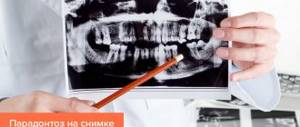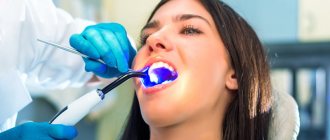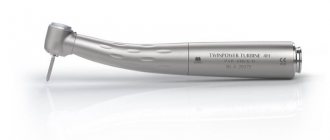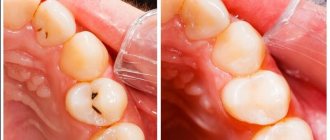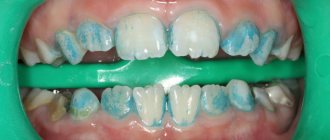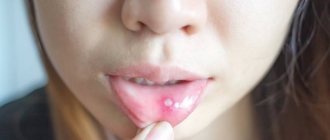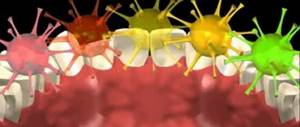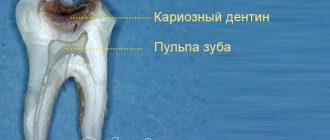Science knows that caries develops due to bacteria that are found in plaque. Almost all types of germs can be transmitted from one person to another. In this regard, the question arises whether caries is contagious. This can be answered in the affirmative. However, everything is much more complicated than it seems.
In this article
- The problem of caries development
- Is tooth decay contagious?
- Why is tooth decay contagious in children?
- Is caries inherited?
- Does caries transfer from one tooth to another?
There are many myths surrounding caries, as one of the most common dental diseases. Most people believe that carious lesions are a consequence of poor hygiene. Some people believe that caries is transmitted through saliva, so you can get it during a kiss. Scientists claim that the main cause of this pathology is cariogenic microbes from the Streptococcus group. Moreover, each of these statements is partially or completely true. Let's try to figure out whether caries is transmitted from person to person or not. First, let's find out what causes this disease.
What is caries
First, let's look at the essence of the problem. Carious lesion is the destruction of tooth tissue under the influence of harmful bacteria of the Streptococcus mutans group. They reproduce without access to oxygen (which is why caries often occur under fillings), feed on sucrose (which is why caries is believed to come from sweets) and secrete acid, which destroys enamel and dentin.
Interesting! Streptococcus mutans is a gram-positive anaerobic bacterium, it actively produces lactic acid and polysaccharide, which settles on the enamel and later turns into plaque or even tartar. However, bacteria can produce this polysaccharide only from sucrose. Thus, by reducing the consumption of sweets, we automatically reduce the negative impact of bacteria on teeth.
Streptococcus mutans is present in the oral cavity of every person, but this does not mean that 100% of the world's population suffers from caries (although the figure is approaching this). Timely oral hygiene, strong immunity and the absence of bad habits inhibit the rapid development of microorganisms and strengthen the enamel. Therefore, we can say with confidence that prevention in this case is a guarantee of health.
Does caries transfer from one tooth to another?
Can a tooth affected by caries lead to infection of the tissue of neighboring teeth with carious bacteria? This happens in the absence of treatment and insufficient hygiene. The number of bacteria in the mouth increases, they spread throughout the entire cavity, forming pathological foci in different places of the jaw. The patient may be diagnosed with multiple caries with localization of carious lesions on several teeth.
So, it is possible to become infected with caries, but carious bacteria alone are not enough for the development of the disease. Only in the presence of several factors does a person begin the process of demineralization of enamel and destruction of dentin. Dentists recommend not to worry about this and not be afraid of contracting caries through a kiss. It is better to pay more attention to hygiene. However, brushing your teeth alone is not enough. As additional hygiene products, it is necessary to use dental floss, rinses and irrigators. Doctors also advise eating right, exercising, and visiting the dentist twice a year. If you follow preventive measures, you can live your whole life without caries.
Sources:
- tvoidantist.ru
- stoma.click
- mnogozubov-ru.turbopages.org
Factors provoking the development of caries
- childhood: children under three years of age are at risk for this disease, since they have not yet developed their own immunity and teeth are just beginning to appear,
- weakened immunity: lack of vitamins and minerals does not allow the body to build full protection,
- unbalanced diet: the predominance of sweet foods in the diet enhances the nutrient environment for Streptococcus mutans, which provokes their active growth,
- insufficient hygiene: clinically tested toothpastes, brush configurations and mouth rinses allow you to remove plaque even from hard-to-reach places, which are the habitat of Streptococcus mutans,
- bad habits: in addition to reducing immunity and destroying enamel, smoking and alcohol disrupt the microflora of the oral cavity, killing beneficial bacteria that can resist pathogenic ones,
- taking certain medications: long-term use of antibiotics, antifungal drugs and some others reduces immunity and slows down metabolic processes in the body, which is why the enamel does not receive enough calcium and fluoride to strengthen,
- hormonal disorders: a failure in the production of hormones also negatively affects metabolism, which leads to thinning of the enamel,
- wearing orthopedic or orthodontic structures: they can mechanically damage the protective shell of the tooth or fit too tightly to it, which is why the crown is not washed with saliva, dries out and cracks. And microbes penetrate into these cracks - and the development of caries begins.
Is tooth decay contagious?
Streptococcus mutans is a caries causative agent that is transmitted through saliva
Carious deformations of dental tissues are associated with biochemical processes hidden under plaque, which are formed due to the vital activity of bacterial microflora. Accordingly, the less often a person uses a toothbrush, the higher the risks.
For example, microorganisms are very fond of sweet simple carbohydrates, which, as a result of fermentation processes, leads to the formation of acids. The latter lower the pH and demineralize tooth enamel - it loses important trace elements (calcium and phosphorus), so it becomes softer and more vulnerable.
The main blame lies with gram-positive, facultative anaerobic bacteria - Streptococcus mutans, which are shown in the photo. These bacilli and others, but to a lesser extent (for example, Streptococcus sobrinus) can attach very firmly to the enamel, form lactic acid from sucrose and form a fairly dense dental plaque.
Thus, during oral contact, the bacterial flora of both partners is mixed, therefore, bacteria that cause caries can be transmitted during a kiss. This also applies to parental affections, and when adults are infected, this is not so dangerous.
Attention. Tooth decay is a disease caused by bacteria that can be transmitted through saliva. But it is impossible to predict in advance whether a person will get sick or not, since predisposing factors are needed. It is incorrect to talk about whether caries is transmitted through a kiss or not due to the above reasons.
How can you become infected with caries?
The bacteria Streptococcus mutans enters our mouths during childhood, and the main source of infection in this case is almost always adults. Moms and dads lick the spoons with which they feed their children, older brothers and sisters give the younger ones a bite of their apple. Parents often make another mistake - they buy their kids one toothbrush between them. This happens in families with twins or triplets. Parents think that they are saving the family budget in this way, but in fact they contribute to the transmission of infection from one child to another.
There is one consolation: adults have nothing to worry about. He is not at risk of becoming infected with Streptococcus mutans because these microorganisms have been living in his mouth for a long time.
Infecting children with caries through a parental kiss
Parents transmit bacteria to children through kissing
Newborns do not have pathogenic microorganisms in their mouths that can cause caries, just as there are no teeth on which they would parasitize. But sooner or later the first teeth erupt and pathogenic bacteria are transmitted along with parental caresses.
Important. The most dangerous infection is for children under three years of age, since their immune system is not yet fully developed.
Below are the reasons that in older children neutralize the penetration of streptococcus mutans and other caries-forming pathogens into the mouth:
- rough food mechanically removes old plaque from the enamel;
- girls and boys over 3 years old (in most cases) are accustomed to oral hygiene;
- a stable buffer capacity of saliva is formed, i.e. it can neutralize acidic elements;
- a more resilient immune system.
The note. The later the mouth infection occurs, the better it will be for the health of baby teeth.
But it’s not only through a parent’s kiss that a baby can be infected; for example, mothers often lick nipples, spoons, slobber on handkerchiefs and wipe their mouths with them, and so on. Some parents, on the contrary, go to extremes: they wipe everything with alcohol, boil it, and so on. To guide mothers on how to maintain normal hygiene (table), watch the video in this article.
Table. How to avoid infecting your child with caries:
| Measure | A comment |
| Before feeding, it is not advisable to taste food (for salt, temperature, etc.) with the same spoon that the child will eat with. Ideally, the child should have his own dishes. |
| When dropped, a pacifier or any other object should be washed rather than licked. |
| There is no need to slobber on the cloth to wipe your baby's lips; for this purpose it is better to have baby wipes with you. |
| Each family member should have their own oral hygiene equipment. They need to be cleaned and replaced at least every two to three months. |
Sooner or later, infection will still occur, but this does not mean the development of caries, since for this there must be many additional factors.
Do adjacent teeth become infected with caries?
The development of pathogenic microbes occurs in hard-to-reach places where the proper amount of saliva, which reduces acidity, or the bristles of a toothbrush, which remove plaque, do not reach. Such a place may be the closure of the walls of two crowns. If you do not use dental floss or an irrigator - special devices for cleaning the interdental space, then bacteria will actively multiply in this cramped corner - and caries will affect both crowns. Thus, the disease does not spread to neighboring units, but develops between them.
Prevention measures
Prevention of caries
Since there is no way to avoid infection, you need to know how to minimize the likelihood of developing the disease. Personal hygiene is important (brushing your teeth twice a day, rinsing your mouth, using dental floss), nutrition should be of high quality, contain healthy vitamins and minerals, and you should eat less sweets.
Smoking and alcohol should be avoided, medications should be taken only as prescribed by a doctor, do not lick children’s spoons and use only your own toothbrush, which should preferably be changed monthly. Extremely important points are maintaining immunity at the proper level and regular preventive examinations at the dentist.
Is caries inherited?
There is an opinion that this disease is genetically determined. This is partly true, but the point is not in the defeat itself, but in indirect factors. For example, metabolic disorders can be inherited, and then weakened enamel will not be able to resist Streptococcus mutans.
Also, a malocclusion can be passed on from parents, which creates areas in the mouth that are difficult to reach with a toothbrush, where caries begins to develop.
In addition, we absorb food habits and hygiene rules from our parents. If mom and dad brush their teeth from time to time, then the child will do the same, which means a favorable environment is created for Streptococcus mutans.
Is it possible to become infected with caries through someone else's toothbrush?
Now that you already understand that caries is not transmitted through a kiss (with the exception of the above-mentioned nuances in relation to small children), the question of the possibility of contracting caries by using someone else's toothbrush also becomes clearer. That is, it is theoretically possible to “pick up” a completely living bacterium, but for an adult whose oral cavity has long been full of carious bacteria, this will mean nothing.
Another thing is that in addition to the relatively harmless Streptococcus mutans, there may be much more dangerous bacteria or viruses on someone else’s toothbrush...
Review:
“It may look absurd, but I completely accidentally, without looking, brushed my teeth with someone else’s toothbrush! I was just in a hurry in the morning and grabbed a brush, as it turned out later, from my mother-in-law (hers is almost the same as mine). It seems that she does not have terrible infections such as AIDS, hepatitis, tuberculosis, syphilis, etc. And she is a rather positive overall elderly woman. Now to the fact that I’m just unpleasant that it turned out so badly, I’m afraid that I’ve suddenly become infected with something... She seemed to have something with oncology, although my relatives told me that it’s not transmitted. I want to ask, do you think I need to take some tests now?..”
Sagalova Daria, Krivoy Rog
The above review describes, of course, a rather comical situation, and the girl is unlikely to be in any danger. However, each family member should have their own toothbrush. Using someone else's toothbrush is unacceptable, not at all from the point of view of possible infection with caries (this is impossible), but for general hygienic reasons.
In conclusion, it is worth noting that there are many much more significant factors influencing the occurrence of caries in adults and children than banal kisses. And the fear of contracting caries or passing it on to someone should not be a reason to give up kissing altogether.
Take care of your teeth, take care of them and live a full life!
Interesting video: is it possible to get caries and how it happens
How to treat caries without a drill
How to find out if you have dental caries
Absolutely all people are carriers of the bacteria Streptococcus mutans, but being a carrier does not mean getting sick. If the body’s immune response is strong enough, if tooth enamel receives a sufficient amount of microelements, if a person takes proper care of his oral cavity every day, then the risk of caries is reduced several times.
For comparison! In countries where preventive medicine is properly structured, this disease occurs several times less frequently. For example, in Finland, 175-200 cases of caries are diagnosed per 1000 children aged 7-12 years, while in Russia for the same number of children there are 1000-1200 cases of caries, i.e. and sick children, and the number of affected teeth in our country is much higher.
Caries is contagious! And six more unexpected facts
June 4 is the day to fight tooth decay
Dentists suggested celebrating the Day against Caries (surprising, right?). And no wonder: this seemingly invisible disease is the most common in the world. At least in children, it occurs five or even eight times more often than bronchial asthma (asthma is the second most common in children). According to various sources, about 80 percent of teenagers at the time of graduation from school have visited the dentist at least once because of a hole in their tooth. Moreover, the peak of caries occurs precisely at the age of 15 to 17 years. And it is very difficult to meet an adult without fillings.
The beginning of June is a good time to remember some interesting facts about caries. Well, pay a visit to the dentist. Just in case.
1. Caries is contagious! Bacteria that cause tooth decay can be transmitted from person to person, American dentists warn. The thing is that the most common causative agent of caries is the bacteria Streptococcus mutans. They especially love children's teeth. Therefore, it is so important that the child has his own spoon and plate. And, moms, don't lick your baby's nipples! After all, caries, or rather the bacteria that provoke it, can be transmitted even through a kiss.
2. Lack of breastfeeding contributes to the development of tooth enamel defects in children - clouding, staining, and a low degree of mineralization. Brazilian scientists associate this with a deficiency of nutrients entering the child’s body during the period of teeth formation (the same calcium that is transmitted through breast milk).
Meanwhile, for a long time it was believed that too much breastfeeding contributes to the development of caries of baby teeth in children. Allegedly, lactose in breast milk contains too much sugar and feeding after a year can have a detrimental effect on the condition of babies’ teeth. Now researchers dispute this, blaming soft and sweet foods - complementary foods given to children - for tooth damage.
3. Older women who smoke lose teeth much more often than men, according to American scientists from the University of Buffalo: compared to non-smoking women, heavy smokers encountered dental problems twice as often. And the risk of tooth loss due to gum disease was six times higher.
4. Parents with a low level of education, with financial and psychological problems, often do not pay attention to the condition of the child’s teeth. Well, as a result, such children have more diseased and missing teeth. This was calculated by scientists from the USA (Cleveland, Ohio).
5. The further north people live, the worse their teeth are, suggests WHO. For example, according to statistics, in equatorial regions (Africa, Asia) caries is not as common as in Scandinavia and North America. However, in developing countries, the prevalence of caries is still high.
6. Even among our ancestors who lived more than six thousand years ago, traces of dental caries were found. Moreover, man is the only animal on earth suffering from this scourge. And the only one that brushes your teeth at least once a day.
7. Although we have all known this for a long time, Australian dentists once again warn: the more sugary drinks, the more caries. And not just because of the sugar.
“The risk of tooth decay should be included in all warnings about drinking sugary carbonated drinks,” says Jason Armfield from the Australian Center for Oral Health Research at the University of Adelaide School of Dentistry. — The high acidity of many sugary drinks leads to erosion of tooth enamel, and, like sugar, contributes to the development of caries.
It would be better to drink fluoridated water, scientists complain, it reduces the risk of developing caries.
BY THE WAY
Where does it come from
In general, not only Brazilian, but also all dentists in the world today associate the appearance of caries with changes in the acid-base environment in the mouth. And with microorganisms that are capable of forming organic acids during their life processes. And high-carbohydrate foods affect this. Therefore, dentists warn:
- If you like soft, carbohydrate-rich foods, then your caries will develop much faster. Love rougher foods.
— In summer, there is another danger - if there is little saliva and it is viscous, then this can contribute to the fixation of bacteria on the walls of the teeth. A larger amount of saliva helps clean the surface of the dentition from harmful microorganisms. So drink water!
— Back in 1948, Russian dentist professor I.G. Lukomsky said that the development of caries is also affected by a lack of vitamins B1 and D, calcium salts, phosphorus, fluorine, and ultraviolet rays. In his opinion, “violation of external factors leads to changes in mineral and protein metabolism in the body, ... as a result, processes develop in the hard tissues of the tooth leading to demineralization of enamel and dentin, and, ultimately, to the formation of a carious cavity.” So spend at least 15 minutes in the sun a day.
TO THE POINT
On May 27, at the 66th World Health Assembly in Geneva, WHO approved a global action plan for the prevention and control of non-communicable diseases for 2013-2020. And special attention is paid to diseases of the oral cavity. In the 2011 Political Declaration on the Prevention of Noncommunicable Diseases (NCDs), the UN recognized that oral diseases share risk factors with the four major chronic diseases - cancer, diabetes, cardiovascular and respiratory diseases - and would therefore benefit from a comprehensive approach to addressing the problem.
HELP "KP"
Dental caries (lat. Caries dentium) “is defined as a local pathological process of external origin, occurring after teething, in which softening of the hard tissues of the teeth occurs, leading to the formation of a cavity.” (WHO definition, 1963).
“Caries is a pathological process that manifests itself after teething, during which demineralization and softening of the hard tissues of the tooth occur, followed by the formation of a cavity” (E. V. Borovsky, 2004).
How to prevent caries: preventive measures
The most effective and, importantly, cheapest way to combat carious lesions is its prevention. Since it is impossible to completely get rid of harmful bacteria, you can slow down or completely stop their reproduction and spread.
- daily oral hygiene (it is important to brush your teeth in the morning after breakfast and in the evening before bed, in the afternoon after lunch and afternoon snack, you need to rinse your mouth with a special solution or just water and remove food particles with dental floss),
- balanced diet (limit the consumption of sugar-containing dishes, increase the consumption of vegetables and fruits, fish and fiber),
- giving up bad habits (tobacco smoke destroys enamel and negatively affects the condition of the gums, reducing their protective function and slowing down metabolism),
- refusal of uncontrolled use of medications, especially antibiotics,
- giving up the habit of licking spoons, pacifiers, toys of small children,
- maintain overall immunity in good shape.
Thus, carious lesions can be avoided, even when infected with the bacteria that cause them.
Can you get HIV through a kiss?
No, HIV is not transmitted through casual contact or kissing. You can drink from the same bottle and kiss with tongue, even if you both have wounds in your mouth (unless they are open bleeding wounds).
The virus is indeed contained in all biological fluids of the human body, but a sufficient amount of HIV for infection can only be contained in the blood
,
semen
,
pre-ejaculate
,
vaginal secretions
and
breast milk
. Saliva, sweat and urine do not contain enough virus to cause infection (even if you have low immunity or are an infant).
How can you become infected with HIV? 4 points, remember them forever:
unprotected sexual contact (vaginal, anal, oral);
sharing of non-sterile injection equipment;
sharing of non-sterile tattoo and piercing equipment;
from an HIV-infected mother to a child (infection is possible during pregnancy, childbirth and breastfeeding).
Rospotrebnadzor has identified an HIV epidemic in Russia: according to existing statistics, almost every hundredth Russian is currently living with this virus (this is a lot). Moreover, the majority are heterosexual men and women who have never used drugs
. In this regard, it is very important to know reliable information about AIDS and not to increase unnecessary fears that stigmatize patients.
The main thing to remember:
“Risk groups” no longer exist; risky behavior exists;
condoms do NOT allow viruses through, so always use them, and at the same time use lubricant so that the protection never breaks;
most viruses do not have symptoms, so DO NOT rely on your intuition - HIV may not manifest itself in any way for years, and the carrier may not even be aware of its presence;
oral contact is NOT safe, including cunnilingus (the link has an example of how to cut a condom for this important matter);
For protection, it is NOT ENOUGH to wash yourself with Miramistin after sexual intercourse - always use condoms.
Clinical Center for Prevention and Control of AIDS
Ministry of Health of the Krasnodar Territory
- home
- About the center > History of the Center
- > Documents of the Center
- > Licenses
- > Chief Physician Page
- > Guide
- > Structure of the Center
- > Center operating hours
- > Contacts
- > State task
- > Plans, Reports
- > Control measures
- > Information security policy
- > Photo gallery
- > Territorial program of state guarantees
useful links
Registration:
8(861) 251-74-76 “Hotline”
:
8(861)255-80-90
Question answer
Dear site visitors!
In accordance with clause 1 of Article 12 of Federal Law No. 59-FZ of May 2, 2006 “On the procedure for considering appeals from citizens of the Russian Federation,” your appeal will be considered within 30 days from the date of registration.
Ask a Question
On this issue, you need to consult an obstetrician-gynecologist.
Using a condom does not guarantee 100% protection against HIV during sexual intercourse, but it is the only way to reduce the likelihood of infection to 2-3%. The indicated 2-3% includes cases where infection occurred during foreplay or after sexual intercourse.
All analyzes are taken in accordance with current standards. If you have a positive result, contact your nearest AIDS Center
To exclude the possibility of contracting HIV infection, it is necessary to be examined immediately, then 3, 6 and 12 months after risky contact.
Please clarify your question, through which smear, how?
No. This information is confidential. To exclude the possibility of contracting HIV infection, you need to undergo examination at the AIDS Center.
The likelihood of infection is not high, but it exists. To exclude the possibility of contracting HIV infection, you need to undergo examination at the AIDS Center.
The probability of infection is up to 4%. To exclude HIV infection, you need to undergo examination at the AIDS Center.
Please clarify what 4+ means in your application? The result of an HIV test is not measured in such numbers.
You need to contact a specialized infectious disease specialist
You need to apply for post-test counseling at the place where the test was taken.
On this issue, you need to consult a dermatovenerologist.
According to current regulatory documents, cosmetologists are not among the groups that are required to be screened for HIV infection during employment or during periodic medical examinations.
The risk of contracting HIV infection and the likelihood of contracting STDs is extremely low. If necessary, consult a dermatovenerologist. To exclude the possibility of contracting HIV infection, it is necessary to be examined now, then 3, 6 and 12 months after contact.
